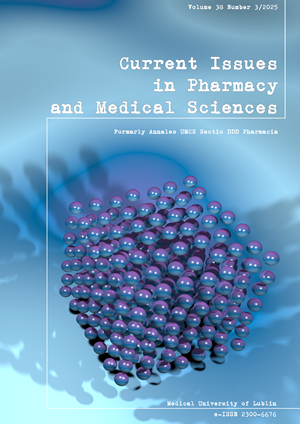The role of microsurgical flaps in the treatment of burn patients – a single center experience
DOI:
https://doi.org/10.12923/cipms-2025-0029Keywords:
contractures, microsurgery, burns, plastic surgery procedures, free tissue flapsAbstract
Severe burns and electrical injuries pose significant challenges in reconstructive surgery, particularly when vital structures such as joints, tendons, nerves and bones are involved. Effective and timely coverage is essential to minimize complications and improve outcomes. The treatment approach includes methods such as conservative treatment, skin grafts, skin substitutes, local flaps and microsurgical free flaps. Each method has its limitations, especially in compromised tissues, where microsurgical flaps are most suitable. These are rarely used initially in burn treatment, but are more commonly employed in secondary reconstruction to address defects from scar contracture release. Microsurgical flaps offer better functional outcomes and a reduced risk of recurrent contractures compared to skin grafts or local flaps. They are a promising solution for severe burns, but pose a significant challenge to the surgeon. This is because microsurgical failure rates are higher in burn patients due to systemic inflammation affecting haemodynamics and haemostasis. Over the last 6 years, 10 microsurgical free flaps have been performed in burn patients at the East Centre of Burns Treatment and Reconstructive Surgery in Łęczna. The aim of this article is to describe our experience with microsurgical reconstruction in burns and to present a review the available literature.
References
1. Platt AJ, McKiernan MV, McLean NR. Free tissue transfer in the management of burns. Burns J Int Soc Burn Inj. 1996;22(6):474-6.
2. Sauerbier M, Ofer N, Germann G, Baumeister S. Microvascular reconstruction in burn and electrical burn injuries of the severely traumatized upper extremity. Plast Reconstr Surg. 2007;119(2):605-15.
3. Ryssel H, Radu CA, Germann G, Otte M, Gazyakan E. Single‐stage Matriderm® and skin grafting as an alternative reconstruction in high‐voltage injuries. Int Wound J. 2010;7(5):385-92.
4. Diehm YF, Fischer S, Gazyakan E, Hundeshagen G, Kotsougiani-Fischer D, Falkner F, et al. Negative pressure wound therapy as an accelerator and stabilizer for incorporation of artificial dermal skin substitutes – A retrospective, non-blinded, and non-randomized comparative study. J Plast Reconstr Aesthet Surg. 2021;74(2):357-63.
5. Pessoa Vaz M, Brandão C, Meireles R, Brito IM, Ferreira B, Pinheiro S, et al. The role of microsurgical flaps in primary burn reconstruction. Ann Burns Fire Disasters. 2018;31(3):233-7.
6. De Lorenzi F, Van Der Hulst R, Boeckx W. Free flaps in burn reconstruction. Burns. 2001;27(6):603-12.
7. Ofer N, Baumeister S, Megerle K, Germann G, Sauerbier M. Current concepts of microvascular reconstruction for limb salvage in electrical burn injuries. J Plast Reconstr Aesthet Surg. 2007;60(7):724-30.
8. Schaden E, Hoerburger D, Hacker S, Kraincuk P, Baron DM, Kozek-Langenecker S. Fibrinogen function after severe burn injury. Burns. 2012;38(1):77-82.
9. Jabir S, Frew Q, El-Muttardi N, Dziewulski P. A systematic review of the applications of free tissue transfer in burns. Burns. 2014;40(6):1059-70.
10. Carty MJ, Taghinia A, Upton J. Fascial flap reconstruction of the hand: A single surgeon's 30-year experience. Plast Reconstr Surg. 2010;125(3):953-62.
11. Hallock GG. Classification of flaps. In: Flaps and reconstructive surgery. Elsevier; 2004:7-15.
12. Harii K, Iwaya T, Kawaguchi N. Combination myocutaneous flap and microvascular free flap. Plast Reconstr Surg. 1981;68(5):700-10.
13. Coutinho BBA, Balbuena MB, Silva TF, Saad FT, Almeida KG, Almeida PYNG. Uso de retalhos microcirúrgicos em pacientes queimados: revisão da literatura. Rev Bras Cir Plást. 2012;27:316-20.
14. Rose EH. Aesthetic restoration of the severely disfigured face in burn victims: a comprehensive strategy. Plast Reconstr Surg. 1995;96(7):1573-85;
15. Tseng WS, Cheng MH, Tung TC, Wei FC, Chen HC. Microsurgical combined scapular/parascapular flap for reconstruction of severe neck contracture: Case report and literature review. J Trauma Inj Infect Crit Care. 1999;47(6):1142.
16. Angrigiani C. Aesthetic microsurgical reconstruction of anterior neck burn deformities. Plast Reconstr Surg. 1994;93(3):507-18.
17. Parrett BM, Pomahac B, Orgill DP, Pribaz JJ. The role of free-tissue transfer for head and neck burn reconstruction. Plast Reconstr Surg. 2007;120(7):1871-8.
18. De La Garza M, Sauerbier M, Günter G, Cetrulo CL, Bueno RA, Russell RC, et al. Microsurgical reconstruction of the burned hand and upper extremity. Hand Clin. 2017;33(2):347-61.
19. Ibrahim AE, Skoracki R, Goverman JG, Sarhane KA, Parham CS, Abu-Sittah G, et al. Microsurgery in the burn population – a review of the literature. Ann Burns Fire Disasters. 2015;28(1):39-45.
20. Duteille F, Bellier-Waast F, Perrot P. Microchirurgie et séquelles de brûlures : quelles applications pratiques ? Ann Chir Plast Esthét. 2011;56(5):382-7.
21. Pan CH, Chuang SS, Yang JY. Thirty-eight free fasciocutaneous flap transfers in acute burned-hand injuries. Burns. 2007;33(2):230-5.
22. Angrigiani C, Artero G, Castro G, Khouri RK. Reconstruction of thoracic burn sequelae by scar release and flap resurfacing. Burns. 2015;41(8):1877-82.
23. Oni G, Saint-Cyr M, Mojallal A. Free Tissue Transfer in Acute Burns. J Reconstr Microsurg. 2012;28(02):77-84.
24. Ziegler B, Hundeshagen G, Will PA, Bickert B, Kneser U, Hirche C. Role, management, and outcome of free flap reconstruction for acute full-thickness burns in hands. Ann Plast Surg. 2020;85(2):115-21.
Downloads
Published
Issue
Section
License
Copyright (c) 2025 Zofia Malgorzata Gorecka, Maciej Laczyk, Marek Majewski, Sergey Antonov, Agnieszka Surowiecka, Tomasz Korzeniowski, Hubert Opalinski, Kamil Torres, Jerzy Struzyna (Autor)

This work is licensed under a Creative Commons Attribution-NonCommercial-NoDerivatives 3.0 Unported License.


